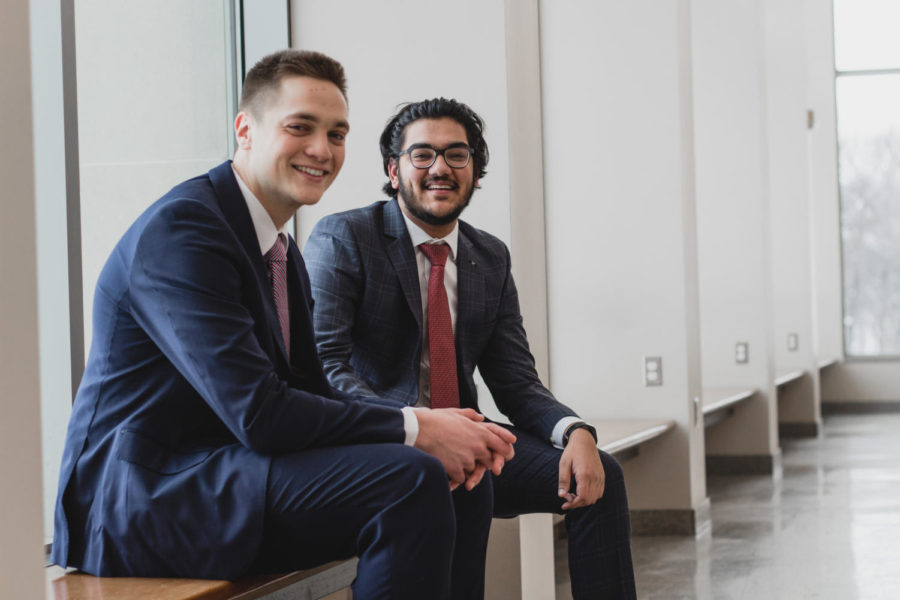Vice presidential candidates to debate, commission hears violations
February 18, 2019
Candidates for vice president of Student Government will compete in the first debate of the Student Government election season Tuesday.
Vishesh Bhatia, Analese Hauber and Annaliessa Michelotti will debate each other at 6 p.m. in the Gallery Room of the Memorial Union.
Debate topics will include transparency, Cyclone community, student wellness, Senate retention, diversity and the role of the vice president.
Bhatia, the running mate of Sen. Austin Graber, is a junior in genetics and currently serves as an Inter-Residence Hall Association (IRHA) senator for Student Government. He is also a community adviser and a Cyclone Aide.
Bhatia’s campaign is “Elevate. Educate. Connect.” and includes platform points such as hosting “reverse town halls,” reinstating the Sexual Assault Awareness cabinet position and “expanding Destination Iowa State,” according to the campaign website.
Hauber is a junior in English, running with Student Senate Speaker Cody Woodruff. She currently serves in Student Government as a United Residents Off Campus (UROC) senator.
Hauber’s “I Stand for U” campaign consists of four main platform points: understanding identities, unlimited opportunities, unified community and unconditional support. Policy proposals from the Woodruff-Hauber campaign include raising the starting wage for on-campus workers to $10 per hour, creating a “campus involvement adviser” and expanding SafeRide and health services to ensure student safety.
“Analese [Hauber] especially wants to focus on the availability of sexual assault forensic exams on and near campus so that victims can easily access the necessary care they deserve,” according to the I Stand for U campaign site.
Michelotti is a junior in women’s and gender studies and is running with Benjamin Whittington. Their campaign, “Bridge the Divide with Ben and Annaliessa” is the only slate running with no current student senators.
Michelotti’s campaign focuses on involving, impacting and empowering students, according to their campaign site. Its platform points include improving parking availability on campus, advocating for a “student friendly hazardous weather policy” and bringing a “spring festival” back to Iowa State’s campus.
The debate comes five days after a violations hearing where the Graber-Bhatia campaign was accused of 12 violations of the Election Code and the Whittington-Michelotti campaign was accused of six.
Both campaigns were accused of multiple “early social media” violations, all of which were dropped.
Election Commissioner Emily Rizvic said the social media violations for both campaigns were dropped on unanimous vote because, although the campaign made accounts and posts before campaigning was allowed, the accounts were not active until campaigning began on Feb. 11.
The Whittington-Michelotti campaign was also accused of two violations for unapproved solicitation in the Memorial Union, which Rizvic said was dropped because the campaign was only soliciting for signatures for their candidate petition and not campaigning.
The sixth accusation against the campaign was in regards to Whittington’s appointment to the Student Government Residency Committee, which Rizvic does not violate any part of the Election Code.
Aside from social media violations, the accusations against the Graber-Bhatia campaign included one violation for leaving an unsupervised petition sheet in a public office and two violations for early endorsement recruitment.
The campaign received a warning for recruiting early endorsements from Kyle Bradford and Tia Carter, submitted by Jacob Schrader and Wyatt Scheu, respectively.
Rizvic said the campaign received only a warning for this violation because it stemmed from a miscommunication between herself and the Graber campaign.
The commission voted unanimously to drop the unsupervised petition violation, based on the campaign’s argument that the petition was accidentally left in West Office Space.
Each publicly-funded executive slate, such as Graber’s, must collect 750 signatures on their petition to have their name on the ballot for president, according to Student Government bylaws. According to the Election Code, “Each signature must be attended to by a member of the campaign team. Therefore, the method of passing around or leaving petition sheets at organizational meetings will be a violation according to Appendix A.”
Rizvic said the commission decided the petition was left in West Office Space on accident and not in an attempt to solicit signatures because no Student Government members’ names were on the petition, the pen colors were all different and there was no pen with the petition in the photo submitted to the commission.
Editor’s Note: A previous version of this story misspelled Annaliessa Michelotti’s name. It has been updated to reflect the correct spelling of her name. The Daily regrets this error.

















